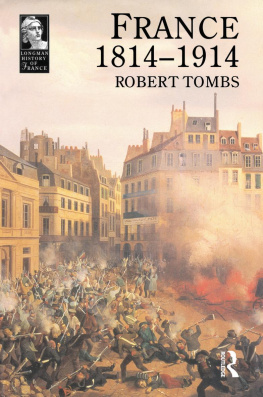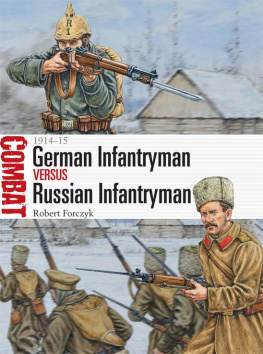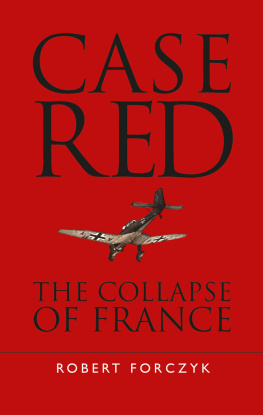Robert Forczyk - Case red: The collapse of France
Here you can read online Robert Forczyk - Case red: The collapse of France full text of the book (entire story) in english for free. Download pdf and epub, get meaning, cover and reviews about this ebook. City: Array, year: 2017, publisher: Bloomsbury Publishing Plc, genre: History. Description of the work, (preface) as well as reviews are available. Best literature library LitArk.com created for fans of good reading and offers a wide selection of genres:
Romance novel
Science fiction
Adventure
Detective
Science
History
Home and family
Prose
Art
Politics
Computer
Non-fiction
Religion
Business
Children
Humor
Choose a favorite category and find really read worthwhile books. Enjoy immersion in the world of imagination, feel the emotions of the characters or learn something new for yourself, make an fascinating discovery.
- Book:Case red: The collapse of France
- Author:
- Publisher:Bloomsbury Publishing Plc
- Genre:
- Year:2017
- City:Array
- Rating:3 / 5
- Favourites:Add to favourites
- Your mark:
- 60
- 1
- 2
- 3
- 4
- 5
Case red: The collapse of France: summary, description and annotation
We offer to read an annotation, description, summary or preface (depends on what the author of the book "Case red: The collapse of France" wrote himself). If you haven't found the necessary information about the book — write in the comments, we will try to find it.
Case red: The collapse of France — read online for free the complete book (whole text) full work
Below is the text of the book, divided by pages. System saving the place of the last page read, allows you to conveniently read the book "Case red: The collapse of France" online for free, without having to search again every time where you left off. Put a bookmark, and you can go to the page where you finished reading at any time.
Font size:
Interval:
Bookmark:

DEDICATION
To Sous lieutenant Martial Rousseau, the first French tanker to die in the Second World War; Lieutenant Paul Barbaste, killed in action at Montherm; Lieutenant Maurice Bourguignon, killed in action at Fort La Fert and Sous lieutenant Rne Pomier Layrargues, who shot down the Luftwaffes top fighter pilot. Democracies are built upon the sacrifices of such men.

Osprey Publishing
c/o Bloomsbury Publishing Plc
PO Box 883, Oxford, OX1 9PL, UK
or
c/o Bloomsbury Publishing Plc
1385 Broadway, 5th Floor, New York, NY 10018, USA
E-mail:
www.ospreypublishing.com
This electronic edition published in 2017 by Bloomsbury Publishing Plc
OSPREY is a trademark of Osprey Publishing, a division of Bloomsbury Publishing Plc.
First published in Great Britain in 2017
2017 (Robert Forczyk)
All rights reserved
You may not copy, distribute, transmit, reproduce or otherwise make available this publication (or any part of it) in any form, or by any means (including without limitation electronic, digital, optical, mechanical, photocopying, printing, recording or otherwise), without the prior written permission of the publisher. Any person who does any unauthorised act in relation to this publication may be liable to criminal prosecution and civil claims for damages.
Every attempt has been made by the Publisher to secure the appropriate permissions for material reproduced in this book. If there has been any oversight we will be happy to rectify the situation and written submission should be made to the Publisher.
A CIP catalogue record for this book is available from the British Library.
Robert Forczyk has asserted his right under the Copyright, Designs and Patents Act, 1988, to be identified as the Author of this Work.
ISBN: 978-1-4728-2442-4 (HB)
ISBN: 978-1-4728-2446-2 (PB)
ISBN: 978-1-4728-2443-1 (eBook)
ISBN: 978-1-4728-2444-8 (ePDF)
ISBN: 978-1-4728-2445-5 (XML)
Front cover: Stuka bombarding, June 1940. (Roger-Viollet/Topfoto)
Osprey Publishing supports the Woodland Trust, the UKs leading woodland conservation charity. Between 2014 and 2018 our donations are being spent on their Centenary Woods project in the UK.
To find out more about our authors and books visit www.ospreypublishing.com. Here you will find our full range of publications, as well as exclusive online content, details of forthcoming events and the option to sign up for our newsletters. You can also sign up for Osprey membership, which entitles you to a discount on purchases made through the Osprey site and access to our extensive online image archive.

Contents
Introduction
We shall go on from catastrophe to catastrophe towards final victory.
Georges Mandel, French minister for the colonies, 1939
When I was a military cadet, four decades ago, one of the first things that I was taught was that the purpose of an army in a democracy was to deter war and if deterrence failed, to win. In 193940, the army of Frances Third Republic widely believed to be one of the strongest and best-equipped armed forces in the world famously failed at both tasks and the result was one of the most ignominious catastrophes in military history. Due to the sudden collapse of France and the eviction of British military forces from the European continent, it appeared for a time as though the Second World War was virtually over before it had even begun in earnest.
The historiography of the Second World War has not been kind to France. The sudden military collapse of the French Third Republic in June 1940 has left indelible images of evacuations, mass surrenders and a triumphant Hitler strutting in front of the Eiffel Tower in Paris. French defeat has often been regarded as the result of incompetent military leadership and battlefield cowardice by unmotivated troops, engendered by moral decay. After that humiliation, Charles de Gaulles attempt to rally a Free French Army is regarded as a merely a footnote to history until American bayonets returned him to Paris in 1944. Seven decades later, the French contribution to the Allied war effort in the Second World War is still regarded as almost negligible.
Many post-mortems have judged the French defeat to be virtually inevitable by focusing on internal political divisions within the Third Republic and the allegedly faulty state of military plans and preparations, although this was hardly apparent to contemporary senior leadership. Prior to its defeat in June 1940, the French Army enjoyed a strong international reputation. When Adolph Hitler ascended to power in Germany in 1933 and began to threaten the peace of Europe, it was Winston Churchill who famously said before the House of Commons, Thank God for the French Army, implying that it was a solid bulwark against aggression. Churchills admiration was based on the French Armys demonstrated tenacity in the First World War. In September 1914, Gnral Ferdinand Foch had responded to the German push toward Paris with the quip, My centre is giving way, my right is retreating, situation excellent I am attacking and then launched a successful counter-offensive on the Marne. In 1916, when faced with a major German offensive at Verdun, Gnral Philippe Ptain had displayed the same kind of sang-froid, confidently stating On les aura! (We shall have them) and his deputy Gnral Robert Nivelle proclaimed Ils ne passeront pas! (They shall not pass!). French rhetoric was matched by French bravery, demonstrated by Major Sylvain Raynals epic week-long defence of Fort Vaux. Individual positions were lost, but the French Army held and later retook all the lost ground in counter-attacks.
Aside from Churchill, there were plenty of foreign observers who were impressed by the French Armys resiliency in the First World War and this faith carried over into the post-war period. Although Britains strategy during the inter-war period was to avoid continental alliances and to focus instead on defence of its extended colonial empire, the leadership in London believed that French military power would continue to counter-balance any effort by Germany to alter the status quo by force. As long as the French Army was strong and could prevent Germany from gaining control over the Channel ports, Britain did not need to maintain a strong army of its own for European contingencies. In April 1938, Churchill still confidently referred to the French Army as the most perfectly trained and faithful mobile force in Europe. When Hitler refused to be deterred from committing aggression against Poland, Neville Chamberlains government felt confident enough in Frances ability to anchor the defence of western Europe that it was willing to call Hitlers bluff. Yet Chamberlain failed to appreciate that the French military had significant deficiencies and was unprepared to fight without significant help from Great Britain. If Chamberlain had better understood the amount of military assistance France would require just to survive an armed confrontation with the Third Reich, he would probably have hesitated to declare war upon Germany.
After the Anglo-French declaration of war upon Germany, military professionals in both Paris and London noted some serious deficiencies in the French military, particularly the armys heavy dependence upon poorly trained reservists and a lacklustre air force, but believed that these deficiencies would be ironed out soon after mobilization. When Paul Reynaud, Frances finance minister, proclaimed
Font size:
Interval:
Bookmark:
Similar books «Case red: The collapse of France»
Look at similar books to Case red: The collapse of France. We have selected literature similar in name and meaning in the hope of providing readers with more options to find new, interesting, not yet read works.
Discussion, reviews of the book Case red: The collapse of France and just readers' own opinions. Leave your comments, write what you think about the work, its meaning or the main characters. Specify what exactly you liked and what you didn't like, and why you think so.













